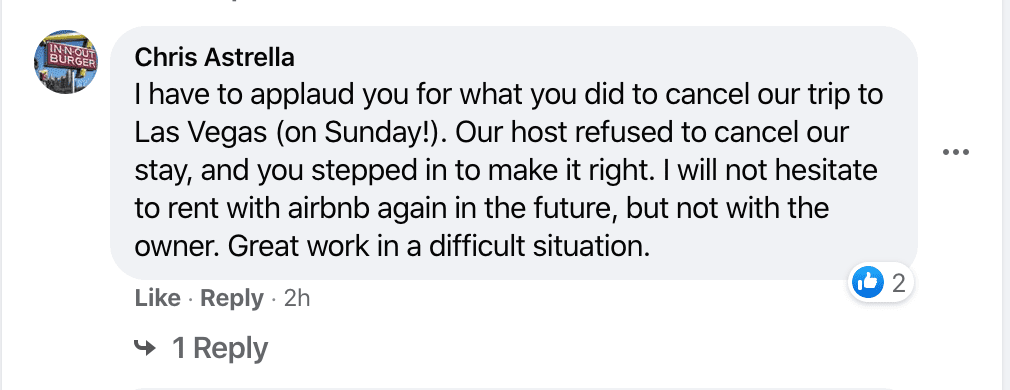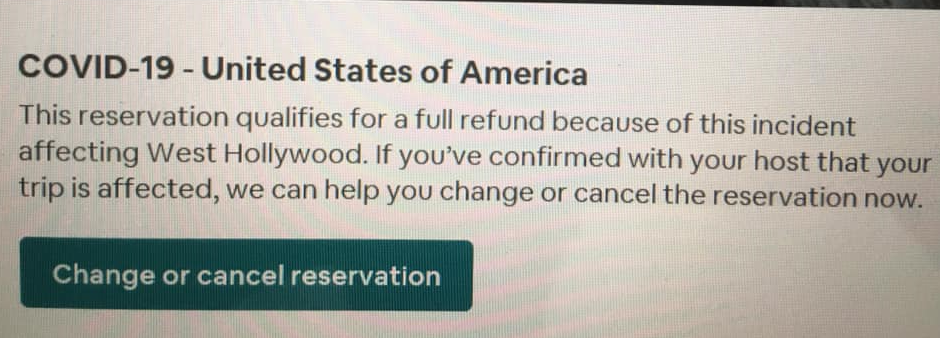Today will mark the moment that we all realized that we were living in a world of complacency. We have become so enamored with the OTAs driving revenue and bookings for us that we forgot that they really don’t understand this business and they have little to no regard for their suppliers.
To be fair, this quixotic moment is brought to you by Airbnb as it announced this morning that it is utilizing the Extenuating Circumstances Policy to allow guests in the United States—as well as a handful of other countries—to cancel their stays between now and April 1st without penalty.
In other words, if you have a confirmed guest set to arrive between March 13 and March 31, 2020, Airbnb is going to give them a full refund whether you agree or not. It is highly likely that this arrival window will include additional future dates as this situation progresses.
Oh, and if you feel like canceling your arrivals between now and April 1, 2020, you can do that too without the public shaming and penalties that Airbnb usually enacts on hosts who do not honor confirmed bookings. Whew! No automated review on your profile saying that you canceled a stay outside of Airbnb policies.
The specific COVID-19 Airbnb Extenuating Circumstances Policy announcement is confusing at best:
“This extenuating circumstances policy covers our hosts and guests with eligible reservations who are impacted by the coronavirus (COVID-19) pandemic. If your trip is covered by this policy, you’ll have the option to cancel your reservation without penalties if you’re a host, and you’ll get a full refund if you’re a guest.”
The problem with this is that as recently as February 25, 2020—the Airbnb Extenuating Circumstance policy and page had very different verbiage and read like this:
“In rare instances, if Airbnb determines that a Guest’s reason for cancellation falls within Airbnb’s Extenuating Circumstances Policy, Airbnb may override the Host’s cancellation policy (ex: flexible, moderate, strict) and make refund decisions.”
It states that an “Endemic disease declared by a credible national or international authority (such as the US Center for Disease Control or the World Health Organization)” might be covered.
I have not been living under a rock.
I know that the COVID-19 pandemic is not “fake news,” and we are in unprecedented times. People are panicking. Taking those calls is hard. We know. We have been doing this for a very long time. We have been doing this through 9/11, hurricanes, oil spills, recessions, and more.
I cannot find evidence that this policy has ever been used in such a broad and sweeping manner.
However, I also know that many property managers have enacted their own COVID-19 policies that are striking a much better balance between the needs of the guests who are afraid to travel and the homeowners who are relying on their spring and summer rental income to pay mortgages. For example, many property managers are successfully allowing guests to rebook their vacation for later in the year without losing any revenue—similar to the airlines.
So why doesn’t Airbnb know how to do this? And why would Airbnb think it can handle this better than the actual property managers and hosts that live and breathe this business every day?
Worse, Airbnb is making us all look bad. Guests whom we have worked hard to convince to rebook now look to Airbnb like a hero.

In fact, Airbnb has automated the process for guests to cancel their stay to make it even easier. Your guests will see messaging that looks like this when they login to check on their reservation:

Tomorrow or sometime soon, we will wake up and find out that other OTAs have followed suit. This has likely become a game of winning market share—or protecting market share.
Also, if you dig even deeper you will figure out that Airbnb is hard at work to update its search results algorithms and consumer-facing search filters to promote properties with the most flexible cancellation policies, which is great for guests but really hard for homeowners and property managers who cannot replace the lost revenue with 24 hours notice like an urban hotel.
This is our wake up call.
The OTAs have a place in your portfolio, but it is not a replacement for your own marketing and brand. Those sales pitches that are out there trying to convince you that you shouldn’t mark up your rates on third-party channels are part of the problem. The cost of a third-party booking is not cheaper, it is not more efficient. You are trading operational control and your brand for instant gratification.
After almost 20 years of doing this, I assure you that the majority of us will lean in and not only survive this challenging time but we will thrive.
Build a marketing strategy for the long game. Have the best website you can afford. Update it often. Implement a PPC, CRM, and marketing strategy that cultivates loyalty, word of mouth, and resiliency in tough times.



Thanks Nick,
Happily we do have a regional website, CaliStays (connected with Northwest Stays and GreatHawaii Stays.
We have always been very cautious about reliance on OTAS, and so this confirms that voice I kept hearing in the back of my mind about the importance of retaining Independence.
Our company is choosing to drop any connection with Airbnb or any other OTA that collects the funds first and then distributes to us later. We will consider using sites that charge a fee for listing – but the guest pays us directly. what if the OTA has collected your funds upfront, then goes Bankrupt?
Giving an OTA direct access to deposit or withdraw funds from our business account has always been uncomfortable for me. After AirBnb exercised their policy to cancel and refund -withdrawing the deposits into our account without any consultation with hosts, I realized the real danger of this relationship.
Our contract advises all guests to invest in Travel Insurance. That is what it is for . . . I believe the PMs are entitled at the very least, to a reasonable cancellation fee (it would probably be less that what the guest would have spent if they had bought the recommended Travel Insurance). They are also entitle to a conversation with their guest to try to offer an incentive to move the reservation to the future.
Lessons Learned… . wishing every Strength and Health as we work through this.
Excellent article and content. Based on 16 years of independently handling my small vacation rental operation, I agree 100% with your synopsis and recommendations.